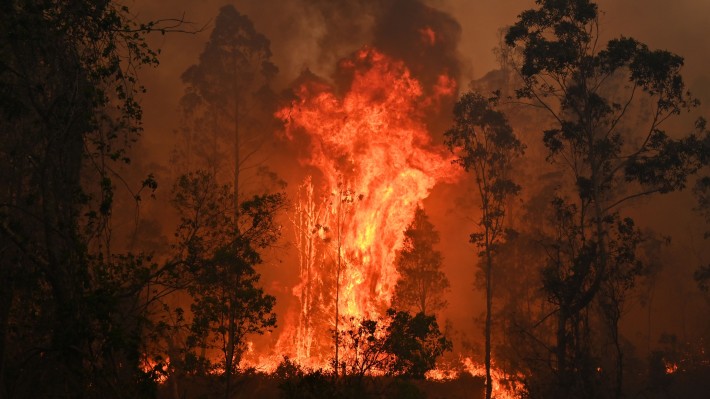Australian bushfires: what we know so far
The devastating blazes have claimed six lives and hundreds of homes

A free daily email with the biggest news stories of the day – and the best features from TheWeek.com
You are now subscribed
Your newsletter sign-up was successful
The Australian cities of Sydney and Adelaide have been blanketed in smoke this week as the country continues to battle an ongoing bushfire crisis.
Health officials have issued warnings over the “hazardous” air quality, with hundreds of residents seeking treatment for breathing problems.
At least six people have died as a result of the bushfires, which have burned millions of acres of land and destroyed hundreds of properties along Australia’s east coast.
The Week
Escape your echo chamber. Get the facts behind the news, plus analysis from multiple perspectives.

Sign up for The Week's Free Newsletters
From our morning news briefing to a weekly Good News Newsletter, get the best of The Week delivered directly to your inbox.
From our morning news briefing to a weekly Good News Newsletter, get the best of The Week delivered directly to your inbox.
What caused the bushfires?
Most of the bushfires are the result of a “catastrophic” combination of long-term drought conditions and strong winds, says The Guardian.
Global warming has played a significant role in the crisis, according to Australia’s Bureau of Meteorology. “Climate change is influencing the frequency and severity of dangerous bushfire conditions in Australia and other regions of the world,” says the agency’s website.
Humans have also played a more direct role in starting the fires. The Australian Institute of Criminology has calculated the average number of bushfires a year in Australia at around 52,000, of which an estimated 50% are either “deliberately lit or suspicious in origin”.
A free daily email with the biggest news stories of the day – and the best features from TheWeek.com
What is happening at the moment?
Smoke is covering Sydney, home to around five million people, for the second time in three days, turning the skies grey and blotting out the view of buildings.
The smoke is expected to linger for days according to officials, and is particularly bad in the city centre and in northern suburbs, with air pollution levels up to ten times higher than the national standard.
Many locals say the air quality is the worst they have ever experienced, and paramedics told the BBC they had treated 450 people for breathing problems.
Health warnings have also been issued to residents in Adelaide, the South Australian capital, large areas of which are enveloped in smoke from a nearby blaze.
The bushfires have prompted officials in Victoria to issue a “code red” - the state’s highest bushfire warning level - for the first time in a decade, reports Melbourne-based newspaper The Age. In February 2009, Australia’s worst bushfires on record killed 173 people across the region.
Country Fire Authority chief officer Steve Warrington has ordered residents to leave some areas of Victoria, warning: “Do not be there. If a fire occurs, you will not survive.”
Record high temperatures are fuelling the misery, with state capital Melbourne recording 40.9C on Thursday.
And the reaction?
Prime Minister Scott Morrison has denied claims that his government’s climate change policies have contributed to the fires, and defended himself against criticism by former New South Wales Fire and Rescue chief Greg Mullins and 23 other fire service bosses.
“Just a 1C temperature rise has meant the extremes are far more extreme, and it is placing lives at risk, including firefighters,” said Mullins. “Climate change has supercharged the bushfire problem.”
In response, Morrison said: “To suggest that with just 1.3% of global emissions that Australia doing something differently - more or less - would have changed the fire outcome this season, I don't think that stands up to any credible scientific evidence at all.”
-
 How the FCC’s ‘equal time’ rule works
How the FCC’s ‘equal time’ rule worksIn the Spotlight The law is at the heart of the Colbert-CBS conflict
-
 What is the endgame in the DHS shutdown?
What is the endgame in the DHS shutdown?Today’s Big Question Democrats want to rein in ICE’s immigration crackdown
-
 ‘Poor time management isn’t just an inconvenience’
‘Poor time management isn’t just an inconvenience’Instant Opinion Opinion, comment and editorials of the day
-
 Epstein files topple law CEO, roil UK government
Epstein files topple law CEO, roil UK governmentSpeed Read Peter Mandelson, Britain’s former ambassador to the US, is caught up in the scandal
-
 Iran and US prepare to meet after skirmishes
Iran and US prepare to meet after skirmishesSpeed Read The incident comes amid heightened tensions in the Middle East
-
 Israel retrieves final hostage’s body from Gaza
Israel retrieves final hostage’s body from GazaSpeed Read The 24-year-old police officer was killed during the initial Hamas attack
-
 China’s Xi targets top general in growing purge
China’s Xi targets top general in growing purgeSpeed Read Zhang Youxia is being investigated over ‘grave violations’ of the law
-
 Panama and Canada are negotiating over a crucial copper mine
Panama and Canada are negotiating over a crucial copper mineIn the Spotlight Panama is set to make a final decision on the mine this summer
-
 Why Greenland’s natural resources are nearly impossible to mine
Why Greenland’s natural resources are nearly impossible to mineThe Explainer The country’s natural landscape makes the task extremely difficult
-
 Iran cuts internet as protests escalate
Iran cuts internet as protests escalateSpeed Reada Government buildings across the country have been set on fire
-
 US nabs ‘shadow’ tanker claimed by Russia
US nabs ‘shadow’ tanker claimed by RussiaSpeed Read The ship was one of two vessels seized by the US military